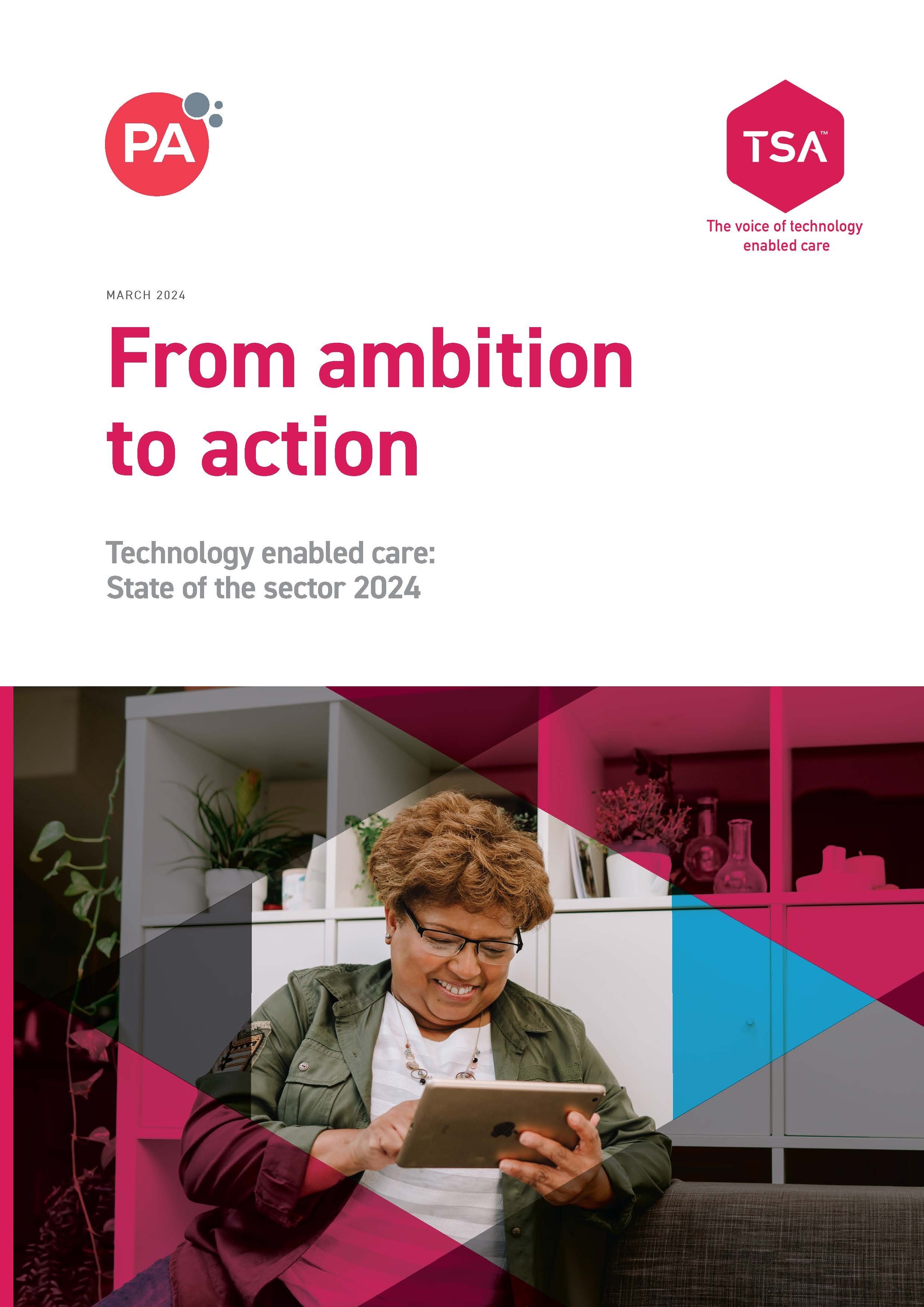
Who can benefit from TEC?: State of the Sector Report 2024
12 June 2024
The first ever State of the Sector report, a collaborative report between TSA and PA Consulting, was released at this year’s ITEC Conference. The report is made up of both qualitative and quantitative data collected through analysis of primary data (online surveys and TSA data sets) as well as secondary data from sector stakeholder literature and national data sets (ONS, NHS etc.)
From the research, one thing was made clear: there is huge potential for TEC to transform the lives of people of all ages, but it is currently underutilised and there is an opportunity to support people who have not traditionally been served by TEC.

'From ambition to action' State of the Sector report 2024
Traditionally, TEC has predominantly been a service commissioned or delivered by councils, often as an element of a social care package, but also within supported housing environments with a focus on safety and raising an alert in an emergency. TEC is not just for the elderly population, but can support people of all ages. Some progressive councils have pushed beyond this, demonstrating how technology can transform the way people’s social care outcomes are supported.
Younger adults and people with learning disabilities
It has been 18 years since the UN declared assistive technology a human right and integral to some disabled people interacting equally within society. Successive parliamentary reports have highlighted how technology can be used to support people with special educational needs and/or disabilities in order to make employment more accessible, if implemented correctly and inclusively. TEC can support outcomes for younger adults and people with learning disabilities based around an individual’s progress – enabling people to move towards greater independence, choice, and control over their lives at their own pace. This is a significant opportunity. Supported living providers can use TEC to assess levels of independence so that care and support can be right-sized. TEC solutions can also be used to reduce or entirely remove the requirement for nighttime support.
Unpaid carers
While official figures put the number of unpaid carers at 5.7 million, Carers UK believes it is actually around 10.6 million (more than 1 in 6 people in the UK), with many carers not recognising themselves as such. In 2023, the Department of Health and Social Care (DHSC) launched a £42.6m grant fund aimed at boosting the quality and accessibility of adult social care. This fund recognises the opportunity to support unpaid carers through technology and innovation, as each council is expected to use part of the funding in this way. Some 66% of councils say they plan to invest time, effort and resources into TEC to support unpaid carers to enable them to continue to provide care. Personalised TEC solutions can enable unpaid carers to take short breaks from caring and reduce carer burnout. These short breaks can be incredibly important for carers to rest, recharge and reduce stress levels
Children with special educational needs
The scale of the opportunity for TEC to support children and their families is underlined by two-thirds of councils saying they do not currently use TEC at all, or only occasionally, with no plans to increase usage to support this group. TEC has the opportunity to support these children and their families by:
- Supporting physical disabilities and complex needs
- Promoting safety in and around the home by supporting children and their families to manage risks
- Promoting independence and wellbeing
TEC has the potential to address the gap in attainment for children with special educational needs. As research commissioned by the Department for Education sets out: “Policy initiatives and investments in assistive technology have the potential to reverse the historical disadvantages experienced by pupils and students with special educational needs and disabilities in ways that improve opportunities.” Yet TEC remains underutilised in the education sector. There are opportunities to use communication aids to support non-verbal children to engage with teachers. TEC can support children to interact within lessons alongside their peers, for example by using text-to-speech software and assistive listening devices.
Disabled students in higher education
Disabled people make up a growing proportion of the student population, rising every year from 311,100 in 2017-18 to 451,580 in 2020-21.15 However, they can face many barriers that adversely affect their outcomes. For example, 36% of autistic students drop out without completing their studies (the highest of any group, compared to 29% for all students).
One way for people to access TEC to support their needs is via the Disabled Students’ Allowance (DSA), which includes £5,849 a year for specialist equipment. DSA’s stated aim is to remove barriers and improve participation in higher education of students with disabilities, and there is a wide range of TEC eligible for funding.18 DSA assessors review applications to determine the type of support depending on the individual’s needs, therefore their awareness and knowledge of TEC is critical to ensure students are supported by the most appropriate solutions for their needs. Higher education can open up a wider world for students, however progressing studies in new environments can be a challenge. Using TEC such as time management software and apps to manage anxiety can result in students maintaining their place on education courses.
Download the full State of the Sector 2024 report here
If you have any questions, please email admin@tsa-voice.org.uk






